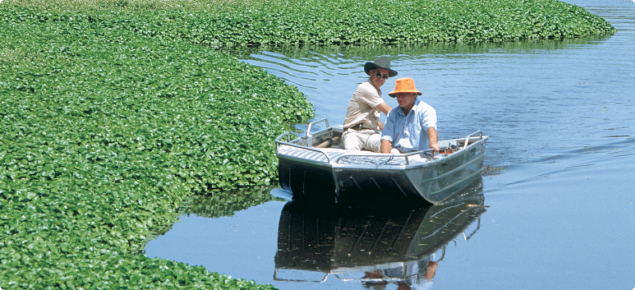Introduction
The aquatic weeds presented in this article are banned throughout Western Australia (WA). However, the Department of Primary Industries and Regional Development (DPIRD) has found several of them in cultivation, mostly around Perth, and salvinia and water hyacinth have been found as far afield as Kununurra and Albany.
These plants must not be kept or sold, and must not be imported. If you have any of these plants in a pond or aquarium, they must be destroyed.
Senegal tea, alligator weed and horsetails have also been found in cultivation. Alligator weed has been mistakenly cultivated as a leafy vegetable or herb. It has been confused with a similar looking plant known as mukunuwenna or ponnsnhsnni (Sri Lanka), ran den (Vietnam), tsurunoge ito (Japan), phak pet thai (Thailand), and kozhuppa or majriya (India). Alligator weed can grow in water, on the banks of water bodies, or in gardens — it has even been found infesting lawns in eastern Australia.
Aquatic weeds all have the potential to block rivers and water ways, and they pose a serious threat to irrigation channels. All these weeds have the ability to spread rapidly forming a dense mat above or below the water. This mat stops light entering the water and depletes the water body of oxygen. Fish and other creatures will die and native plants will be shaded out.
Horsetails or scouring rushes (Equisetum spp.) are primitive relatives of ferns. Horsetails have deep, invasive rhizomes and have become serious weeds in other parts of the world. They grow in damp soil and are a threat to wetlands, water courses, irrigated pastures and horticulture. Horsetails are also toxic to livestock. All Equisetum spp. must be destroyed.
Aquarium and pond owners
Do not dispose of any plant from your aquarium or pond in or near any waterway or drain. Apart from horsetail, all of these plants can be killed by being dried out on newspaper. When the plants are dead, bury them or dispose of them with other green waste if collected by your local Shire or council. Salvinia and water hyacinth can also be killed by composting. Horsetails are extremely difficult to kill. Seek advice on disposal from DPIRDif you have any horsetail (Equisetum spp.) plants.
Aquatic weeds cost!
Apart from environmental damage they cause, aquatic weeds are extremely expensive to eradicate. It cost more than a quarter of a million dollars to eliminate hydrocotyl from WA's Canning River. In Barren Box swamp near Griffith in New South Wales over $1 million has been spent to eradicate a two year old infestation of alligator weed.
How can you help?
If you see any of these water plants, or others that appear to be spreading, notify the Pest and Disease Information Service (PaDIS):
- Alligator weed
- Arrowhead
- Cabomba
- Horsetail
- Hydrocotyl
- Lagarosiphon
- Leafy elodea
- Sagittaria
- Salvinia
- Senegal tea
- Water hyacinth
- Water lettuce
Protecting agriculture and the environment is everyone's business. Report any suspect declared plants.
Search > detect > report
| MyPestGuide™ Reporter | Pest and Disease Information Service (PaDIS) |

